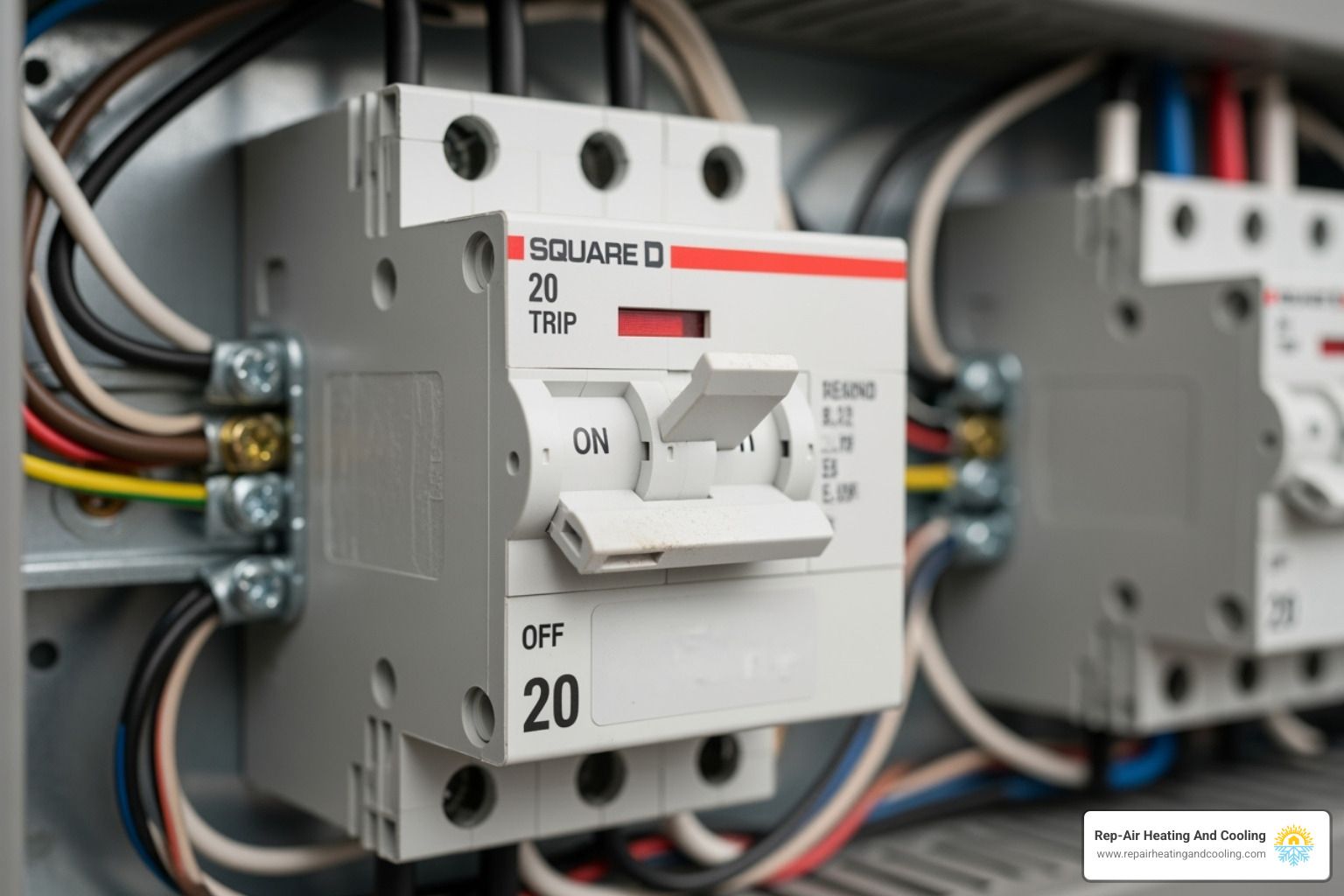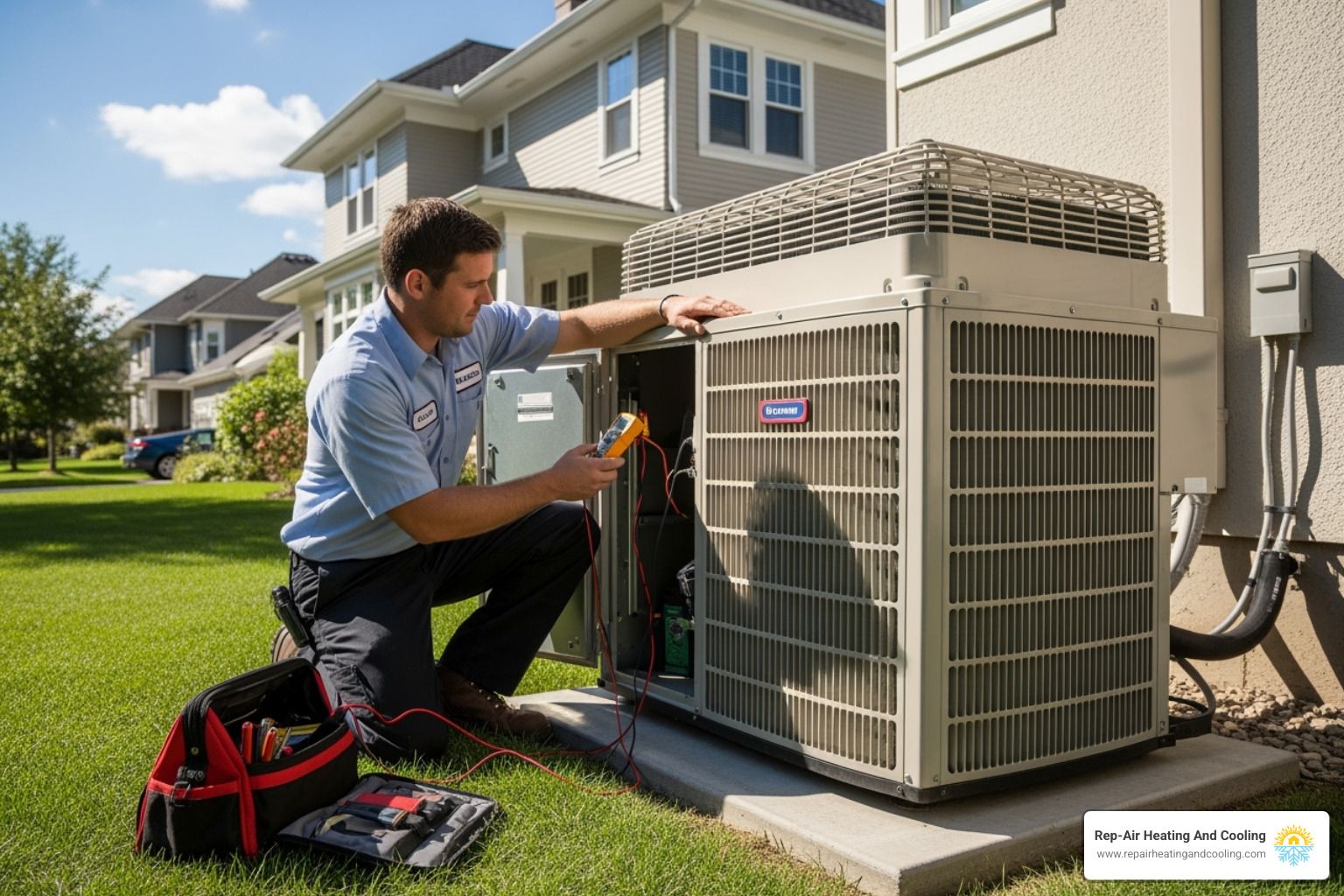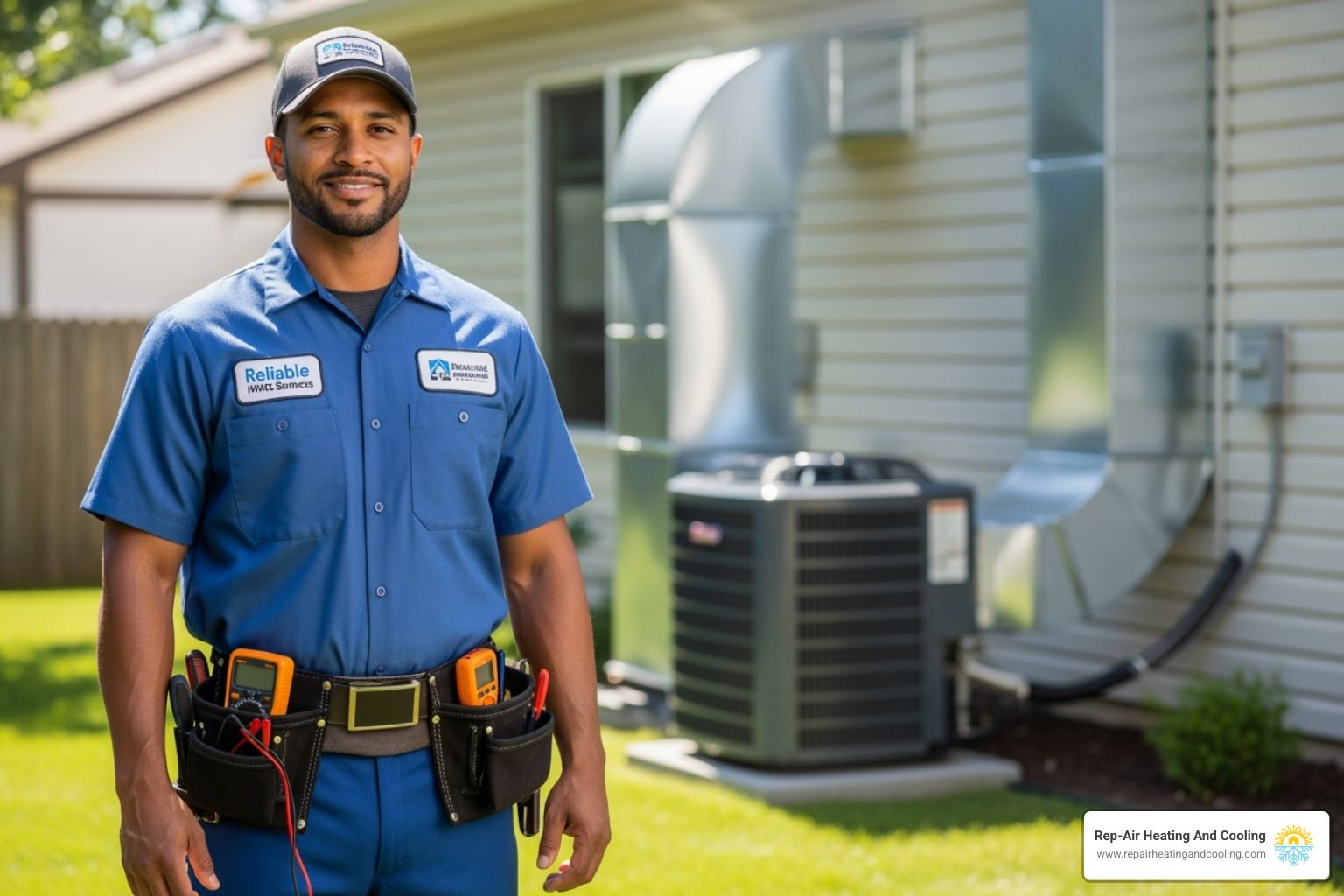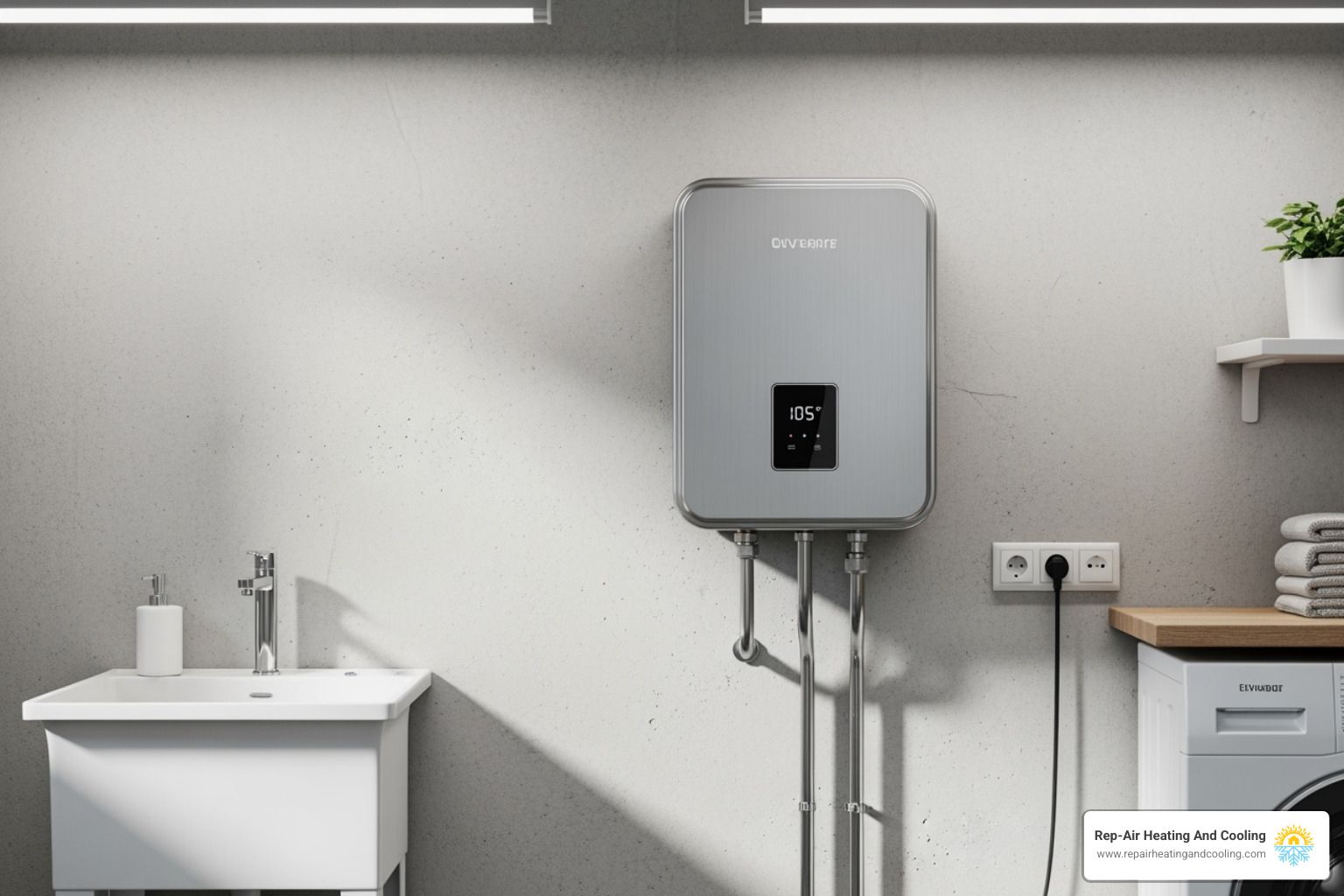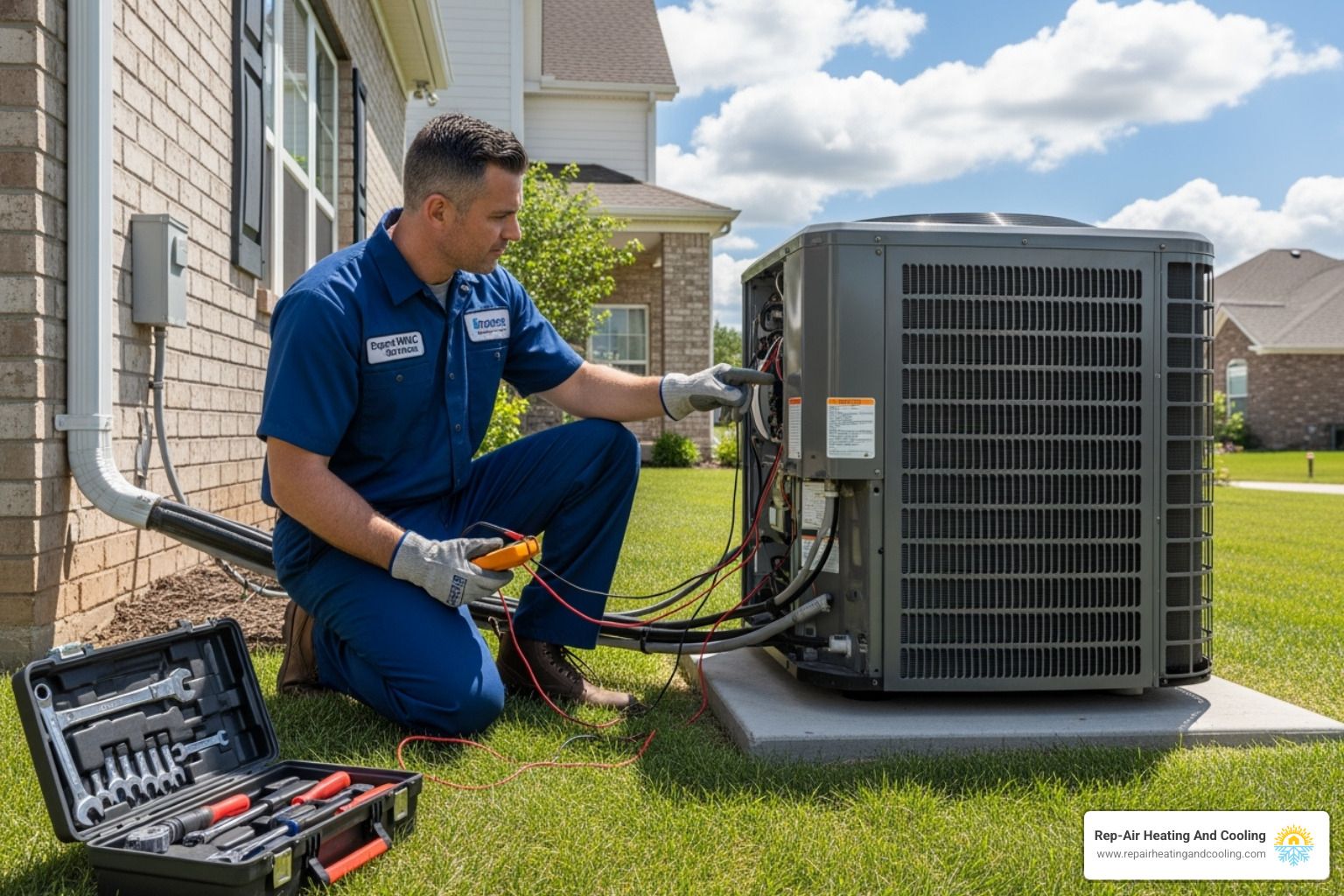AC Breaker Blues: Common Culprits and Quick Fixes
IMPORTANT NOTE: . Our company is located in British Columbia, Canada. If you are reading this article in another location, we hope you enjoy the information, but unfortunately we cannot service you.

Table of Contents
ToggleWhy Your AC Breaker Keeps Tripping
When your AC breaker keeps tripping, it’s your home’s safety system telling you something is wrong. Here’s what’s likely happening and what you need to do:
Most Common Causes:
- Dirty air filter – Forces your system to work harder
- Electrical short circuit – Damaged wiring or components
- Failing compressor – The heart of your AC is struggling
- Overloaded circuit – Too much power demand
- Bad capacitor – Can’t start the motor properly
Immediate Steps to Take:
- Turn off your AC at the thermostat
- Wait 30 minutes before resetting the breaker
- Check and replace your air filter if dirty
- If it trips again, stop resetting and call a professional
A circuit breaker that keeps tripping isn’t just annoying – it’s a critical safety warning. Circuit breakers are designed to cut power when they detect dangerous electrical conditions that could damage your equipment or start a fire.
Don’t ignore this problem. Repeatedly resetting a tripping breaker can cause serious damage to your AC system and create fire hazards. While some causes like a dirty filter are simple fixes, others require professional diagnosis.
A circuit breaker is an electrical switch that automatically turns off when the current becomes too strong, protecting your equipment and preventing fires. When your AC breaker keeps tripping, your air conditioner is likely pulling more amps than the breaker is rated for, or there’s an electrical fault. The breaker is doing its job by protecting you from dangerous overcurrents. For a deeper dive, you can explore resources on Circuit breakers. The reasons for an AC drawing too much power range from simple maintenance issues to complex failures. For more general advice, check out our guide on Troubleshooting AC Circuit Breaker Issues.
Dirty Air Filter or Condenser Coils
A dirty air filter is a common cause for a tripped breaker. When clogged with dirt, it restricts airflow, forcing the blower fan to work harder and draw more power than the circuit can handle. This is often a simple fix.
Similarly, dirty outdoor condenser coils can cause problems. These coils release heat from your home, but if they’re covered in dirt or debris, they can’t dissipate heat effectively. The compressor then works harder, drawing more power and potentially tripping the breaker. Keeping both the filter and coils clean is vital for efficient operation. If your AC isn’t cooling well, this could be why. Learn more here: Why is my AC Not Cooling Properly?.
Electrical Faults and Failing Breakers
The issue might be with the electrical system itself. Loose wiring connections can create resistance and heat, leading to a tripped breaker. Damaged wire insulation can cause a short circuit or ground fault—a sudden, massive surge of electricity when a “hot” wire touches a neutral wire or grounded surface. A short in the compressor or fan wiring will trip the breaker immediately. Ground faults are especially dangerous as they can energize the metal parts of your AC, creating a shock hazard.
While less common, the breaker itself can fail. An old or faulty breaker may trip constantly. Signs like a burning smell, buzzing from the panel, or a panel that’s warm to the touch indicate a serious problem requiring immediate professional attention. Electrical failures are a leading cause of home fires, according to the National Fire Protection Association.
Failing AC Components
Internal AC components that do the heavy lifting can also be the cause when your AC breaker keeps tripping.
Compressor Issues: The compressor, the ‘heart’ of your AC, is a major power consumer. An old or failing compressor will struggle and draw excessive electricity, especially at startup, tripping the breaker. A more severe problem is a ‘grounded compressor,’ where internal motor windings touch the metal casing, creating a direct short to ground and an immediate trip. For more clues, see our guide on Signs Your AC is Going to Break Down.
Worn-Out Fan Motor: The outdoor condenser fan and indoor blower fan are critical for airflow. If these motors are worn out or failing, they’ll draw more power to run, which can trip the breaker. For more details, see AC Fan Motor Issues and Fixes.
Bad Capacitor: Capacitors provide the jolt of electricity to start your AC’s motors. If a start or run capacitor goes bad, the motor will struggle and draw excessive current, causing an overload and a tripped breaker. Replacing a bad capacitor is a common fix for tripping issues.
First Steps for a Tripped AC Breaker
If your AC breaker keeps tripping, take it seriously. These safe, initial steps can help you identify or even solve the problem.
First, turn off your AC at the thermostat for safety. Then, let the system rest for 30 minutes to cool down and allow internal components to reset. While waiting, check your air filter. If it’s dirty, replace it. A clogged filter is a very common and easy-to-fix cause of tripping breakers.
After 30 minutes, you can try to reset the breaker safely. For more troubleshooting tips, see our guide on Why is my Air Conditioner Not Turning On?.
How to Safely Reset Your Breaker
Resetting a breaker is simple but must be done correctly for safety.
- Locate your electrical panel (the gray metal box in your basement, garage, or utility closet).
- Find the tripped AC breaker. It will be in the middle or ‘off’ position, not fully ‘on’.
- Push the breaker firmly to the ‘off’ position first. This is a crucial step to ensure it properly resets.
- Switch it back to the ‘on’ position.
After resetting, listen for any buzzing or crackling from the panel, as these are red flags for serious electrical issues.
What to do if your AC breaker keeps tripping after a reset
If the AC breaker keeps tripping after a reset, especially immediately, stop resetting it. Continuously resetting a breaker that’s tripping due to a fault is dangerous. You risk an arc flash (a violent electrical explosion), fire, and permanent damage to your AC system, such as burning out the compressor.
A breaker that trips again indicates a serious underlying issue that requires a professional. It’s no longer a DIY situation. Leave the AC off and call an expert. The breaker is protecting your home from a dangerous fault. For more guidance, see our article on AC Needs Professional Repair: Signs.
When to Call a Professional
While simple checks are fine, some AC electrical issues require a professional. Your system will give you clear warning signs that it’s time to call for help.
Call a professional immediately if you notice:
- A burning smell from your AC or electrical panel. This indicates overheating components and a fire risk.
- Loud buzzing sounds from your electrical panel. This can signal loose connections or a failing breaker.
- A breaker that is hot to the touch. This means excessive current is flowing or the breaker is failing.
- The breaker trips instantly after a reset. This points to a serious short circuit or grounded component.
If you’ve tried basic troubleshooting and your AC breaker keeps tripping, it’s time to call an expert. For more insight, check our guide on Common AC Repair Issues & Solutions.
HVAC Technician vs. Electrician: Who to Call?
It can be confusing to know who to call for a tripping AC breaker. Here’s a breakdown of which professional to contact.
| Who to Call | Their Expertise | When You Need Them |
|---|---|---|
| HVAC Technician | Specialists in AC components: compressors, fan motors, capacitors, and internal controls. | Call an HVAC tech if you suspect the AC unit itself is the problem. This includes a failing compressor, worn-out fan motor, bad capacitor, or internal wiring issues. |
| Electrician | Experts on your home’s electrical system: house wiring, the main electrical panel, circuit breakers, and disconnect boxes. | Call an electrician if the problem seems to be with the house wiring, the breaker panel, or the breaker itself, especially if the breaker trips with the AC disconnected. |
Our advice: If you’re unsure, start with an HVAC technician. We can quickly determine if the issue is with your AC system or if it requires an electrician. At Rep-Air Heating And Cooling, we’ll always point you in the right direction.
The Dangers of Ignoring an AC that keeps tripping the breaker
It’s tempting to ignore a breaker that keeps tripping, but doing so can lead to expensive and dangerous consequences.
-
Permanent AC Damage: Each trip puts stress on your AC’s components. Repeatedly resetting the breaker can wear out expensive parts like the compressor, potentially leading to a full system replacement and shortening your unit’s lifespan.
-
Electrical Fire Risk: A breaker trips to prevent wires from overheating. Ignoring the warning by repeatedly resetting it can allow wires to overheat, melt insulation, and ignite surrounding materials, causing a house fire.
-
Electrical Panel Damage: Resetting a faulty breaker can also damage the panel itself, leading to more extensive and costly electrical repairs.
A tripping breaker is a critical safety warning. At Rep-Air Heating And Cooling, your safety is our priority, and we urge you to address these issues promptly.
How to Prevent Future Breaker Issues
Fixing a tripped breaker is one thing; preventing it from happening again is the real goal. Most breaker trips are avoidable with proper care and maintenance.
Simple preventative measures include:
- Regularly changing your air filter.
- Keeping your outdoor unit clean and free of debris.
- Avoiding overloading the circuit with other high-power appliances.
For older systems, a hard start kit can help with startup issues, while annual professional tune-ups are key to catching problems early. Proactive maintenance leads to fewer emergencies, lower energy bills, and a longer-lasting system. Learn more about why this matters at Preventative AC Service is Essential.
The Role of Regular AC Maintenance
Regular maintenance keeps your AC running safely and efficiently, reducing power draw and stress on your electrical system.
-
Clean Filters: A clogged filter makes your blower motor work overtime, drawing excess power. Check and replace your filter monthly during peak season to prevent this common cause of tripping.
-
Clean Coils: Dirty outdoor condenser coils force the compressor to work harder to release heat, increasing electrical draw. Professional cleaning ensures efficient operation.
-
Professional Tune-ups: During an annual tune-up, we do more than clean. We check electrical connections, tighten loose wiring, and inspect for wear to prevent your AC breaker keeps tripping. This proactive care extends your system’s lifespan. For tips on your own inspections, see our guide: How to Inspect Your A/C for Potential Issues (Now is a Great Time!).
What is a Hard Start Kit?
A hard start kit is like a booster for an aging AC compressor. As compressors age, they require more power to start, and this high startup amperage can trip the breaker.
A hard start kit provides a powerful electrical boost to the compressor during startup. This extra capacitor function helps the motor start quickly and smoothly, reducing the high current draw that causes the breaker to trip.
While a hard start kit can be an effective solution for startup-related trips, professional installation is crucial. A Rep-Air Heating And Cooling technician can determine if your system needs one and install it correctly. That needing a hard start kit is often a sign of an aging compressor, so it’s a good time to consider your system’s long-term health.
Frequently Asked Questions about a Tripping AC Breaker
We hear these questions almost daily from homeowners across the Lower Mainland. When your AC breaker keeps tripping, it’s natural to wonder about quick fixes and what’s really going on. Let’s clear up some common misconceptions and give you the straight facts.
Can I just install a bigger breaker to stop it from tripping?
Absolutely not. This is an extremely dangerous idea that could lead to a house fire. A circuit breaker is precisely sized to protect the wiring in your walls from overheating. Installing a larger breaker allows more current to flow through wires than they can safely handle.
This creates a major fire hazard, as the wires can overheat, melt their insulation, and ignite surrounding materials inside your walls. The breaker’s size is a critical safety feature, not an obstacle. If your AC breaker keeps tripping, the underlying problem must be diagnosed and fixed, not bypassed with an oversized breaker.
Why does my AC breaker trip immediately when it turns on?
An immediate trip indicates a massive and dangerous electrical surge, not just an overworked system. The most common causes are:
- Short Circuit: Damaged wiring allows a ‘hot’ wire to touch a neutral or ground wire, creating a huge surge of current.
- Grounded Compressor: The compressor’s internal motor wiring shorts out against its metal casing, sending electricity straight to the ground.
- Locked-up Motor: A seized compressor or fan motor attempts to draw an immense amount of power to start, instantly tripping the breaker.
An instant trip signals a serious electrical fault. Do not keep resetting the breaker.
Is it normal for the AC breaker to trip during a heatwave?
It’s more common during heatwaves but shouldn’t be considered ‘normal.’ Your AC is under increased strain during extreme heat, working harder and longer, which draws more power. However, frequent tripping during hot weather is not normal and points to an underlying weakness.
This could be due to dirty coils, a failing capacitor, or an aging compressor. An occasional trip during a record heatwave might be understandable, but if it becomes a pattern, your system is telling you it’s struggling. This is especially true for older systems. Our guide on 5 Signs It’s Time for a New AC Unit can help you decide on the next steps. A single trip isn’t an emergency, but repeated trips require a professional diagnosis.
Stay Cool and Safe: Final Thoughts
When your AC breaker keeps tripping, it’s a critical safety warning about a potential electrical hazard. While some causes, like a dirty air filter, are simple DIY fixes, others, such as failing compressors or short circuits, require a professional.
Never ignore a repeatedly tripping breaker. Continuously resetting it puts your home and family at risk. The key is to address the root cause promptly. Most issues, when caught early, can be resolved effectively through regular maintenance and professional service, preventing larger, more expensive problems.
At Rep-Air Heating And Cooling, we understand the stress of a malfunctioning AC. We treat every customer like family, providing expert diagnosis and repair for everything from simple fixes to complex electrical faults. Our team offers comprehensive HVAC, plumbing, and electrical services throughout the Lower Mainland, including Mission BC, Aldergrove, Anmore, Belcarra, Burnaby, Chilliwack, Delta, Ladner, New Westminster, Port Coquitlam, Port Moody, Richmond, Surrey, White Rock, Abbotsford, Maple Ridge, Pitt Meadows, Langley, and Coquitlam.
Don’t let a tripping breaker compromise your comfort and safety. Our experienced technicians are ready to diagnose the problem and get your system running safely again. Contact us for service in Abbotsford and surrounding areas – your safety is our top priority.
Request your service today!
Our team of highly trained technicians are standing by ready to help you out with all of your service, repair, and installation needs. You can count on us for on-time repairs, professional installation, and the friendliest customer service in town!Contact Rep-Air Heating & Cooling today to get started with service by requesting a quote online, or by phone at (844) 218-3362.
Request Service
Contact us today to request an estimate or schedule service.




